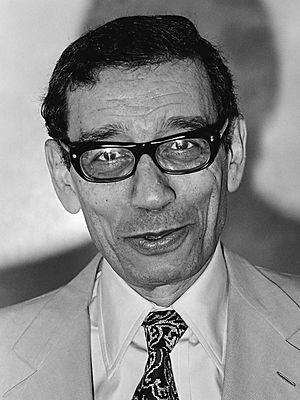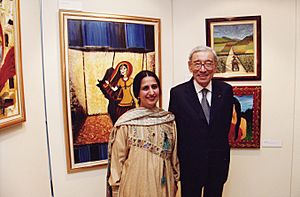Boutros Boutros-Ghali facts for kids
Quick facts for kids
Boutros Boutros-Ghali
|
|
|---|---|
| Ⲡⲉⲧⲣⲟⲥ Ⲡⲉⲧⲣⲟⲥ-Ⲅⲁⲗⲓ بطرس بطرس غالي |
|
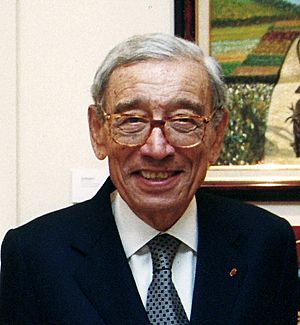
Boutros-Ghali at UNESCO in Paris, 2002
|
|
| Secretary-General of the United Nations | |
| In office 1 January 1992 – 31 December 1996 |
|
| Preceded by | Javier Pérez de Cuéllar |
| Succeeded by | Kofi Annan |
| Secretary-General of La Francophonie | |
| In office 16 November 1997 – 31 December 2002 |
|
| Preceded by | Jean-Louis Roy as Secretary General of the ACCT |
| Succeeded by | Abdou Diouf |
| Acting Minister of Foreign Affairs | |
| In office 17 September 1978 – 17 February 1979 |
|
| Prime Minister |
|
| Preceded by | Muhammad Ibrahim Kamel |
| Succeeded by | Mustafa Khalil |
| In office 17 November 1977 – 15 December 1977 |
|
| Prime Minister | Mamdouh Salem |
| Preceded by | Ismail Fahmi |
| Succeeded by | Muhammad Ibrahim Kamel |
| Personal details | |
| Born | 14 November 1922 Cairo, Kingdom of Egypt |
| Died | 16 February 2016 (aged 93) Cairo, Egypt |
| Political party |
|
| Alma mater | |
| Signature | |
Boutros Boutros-Ghali (born 14 November 1922 – died 16 February 2016) was an important Egyptian politician and diplomat. He served as the sixth Secretary-General of the United Nations (UN) from 1992 to 1996.
Before leading the UN, Boutros-Ghali was a professor and held high positions in Egypt's government. He was the acting foreign minister and vice foreign minister. During his time at the UN, the world faced several big challenges, like the breakup of Yugoslavia and the terrible Rwandan genocide. After his UN role, he became the first Secretary-General of La Francophonie, an organization for French-speaking countries, from 1997 to 2002.
Contents
Early Life and Education
Boutros Boutros-Ghali was born in Cairo, Egypt, on 14 November 1922. His family belonged to the Coptic Orthodox Christian faith. His grandfather, also named Boutros Ghali, was the Prime Minister of Egypt from 1908 to 1910.
Boutros-Ghali finished his studies at Cairo University in 1946. He then earned a PhD in international law from the University of Paris in 1949. He also received a diploma in international relations from Sciences Po in the same year.
From 1949 to 1979, he worked as a Professor of International Law and International Relations at Cairo University. He also held important positions at research centers and was a visiting professor at other universities around the world. In 1986, he received an honorary doctorate from Uppsala University in Sweden.
Political Career
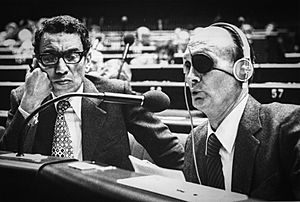
Boutros-Ghali's political journey began during the time of Egyptian President Anwar Sadat. He was a member of the Central Committee of the Arab Socialist Union from 1974 to 1977.
He served as Egypt's Minister of State for Foreign Affairs from 1977 until 1991. In this role, he helped with the Camp David Accords, which were peace agreements between President Sadat and Israeli Prime Minister Menachem Begin. These agreements were a big step towards peace in the Middle East.
United Nations Secretary-General
Becoming Secretary-General in 1991
In 1991, Boutros-Ghali was a candidate for Secretary-General of the United Nations. This top job at the UN was open because the previous leader, Javier Pérez de Cuéllar, was finishing his second term. It was Africa's turn to lead the UN.
Boutros-Ghali competed with Bernard Chidzero from Zimbabwe. After several rounds of voting, Boutros-Ghali won and became the new Secretary-General.
His Time in Office (1992–1996)

Boutros-Ghali's time as Secretary-General was busy and sometimes difficult. In 1992, he presented a plan called An Agenda for Peace. This plan suggested ways the UN could help stop violent conflicts around the world. His main goals were for the UN to:
- Work more to support democracy.
- Use diplomacy to prevent crises before they got worse.
- Increase the UN's role in keeping peace.
Even though these goals were similar to what the US President at the time wanted, Boutros-Ghali often disagreed with the United States. This was especially true when he tried to get the UN more involved in civil wars, like those in Somalia (1992) and Rwanda (1994). The United States did not want to send its peacekeepers under UN command.
Boutros-Ghali faced criticism because the UN struggled to act effectively during the Rwandan genocide in 1994. During this terrible event, many people were killed. He also found it hard to get enough support for the UN to help in the ongoing civil war in Angola.
One of the biggest challenges during his term was dealing with the Yugoslav Wars. After the country of Yugoslavia broke apart, there was a lot of conflict. The UN peacekeeping force in Bosnia and Herzegovina was not very effective, which led to NATO getting involved in 1995. His reputation became linked to the wider discussions about how effective the UN was and the role of the United States within the UN.
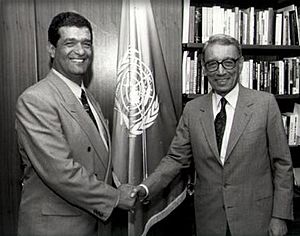
In Somalia, some people felt that he made the crisis worse. They believed he had a personal disagreement with a clan leader named Mohamed Farrah Aidid. This led to more fighting, including the Battle of Mogadishu in 1993.
Not Re-elected for a Second Term
Boutros-Ghali wanted to serve a second term as Secretary-General, which is usually allowed. However, the United States tried to stop him from being re-elected. The US ambassador, Madeleine Albright, even asked him to step down.
Despite this, most other countries in the United Nations Security Council supported Boutros-Ghali. He received 14 out of 15 votes in the Security Council, but the United States cast the only negative vote, which was a veto. A veto means a country can block a decision.
After several meetings where no agreement was reached, France suggested a compromise: Boutros-Ghali could serve a shorter two-year term. But the United States still said no. Eventually, Boutros-Ghali decided not to continue his candidacy. He was only the second Secretary-General to be denied a second term by a veto.
Later Life
From 1997 to 2002, Boutros-Ghali served as the Secretary-General of La Francophonie, an organization that promotes the French language and culture.
From 2002 to 2005, he was the chairman of the board for the South Centre. This is a research group for developing countries. Boutros-Ghali also played a key role in creating Egypt's National Council for Human Rights and was its president until 2012.
He supported the idea of creating a United Nations Parliamentary Assembly. This would allow citizens to have more direct involvement in global decisions.
Personal Life and Death
Boutros-Ghali's wife, Leia Maria Nadler, grew up in an Egyptian Jewish family. She later converted to Catholicism.
Boutros-Ghali passed away on 16 February 2016, at the age of 93, in a hospital in Cairo. He had been admitted for a broken bone. A military funeral was held for him, and he was buried in the Petrine Church in Cairo.
Images for kids
-
Boutros Boutros-Ghali on a stamp from Turkmenistan (1996).
See also
 In Spanish: Butros Butros-Ghali para niños
In Spanish: Butros Butros-Ghali para niños
- List of Copts
 | John T. Biggers |
 | Thomas Blackshear |
 | Mark Bradford |
 | Beverly Buchanan |


